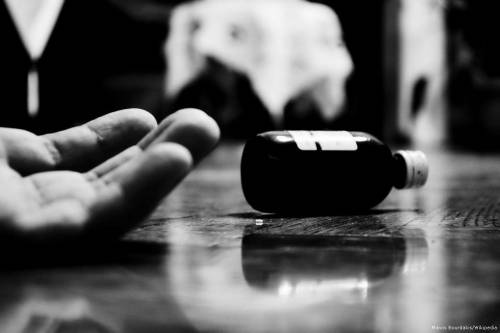Nigeria has seen an upsurge in suicide cases recently, some health experts have blamed the biting economic hardship and hunger.

OGUN, Nigeria – A 35-year-old man, identified as Emmanuel Urhobocha, has allegedly died by suicide in his apartment on Alafia Street in Sango-Ota, located in the Ado-Odo Ota Local Government Area of Ogun State, police said.
The incident took place around 9:00 a.m. on Friday, according to the police.
The state police spokeswoman Odutola Omolola said that the deceased’s roommate, identified as Obabiyi David, had gone to the Sango-Ota Police Division to report that his flatmate was acting irrationally.
“He (David) stated that Urhobocha was behaving oddly and even mentioned that the deceased had attacked him with a knife at one point. David sustained injuries but managed to escape the assault,” Ms Odutola stated.
A team of policemen from the Sango-Ota division was dispatched to question Urhobocha regarding the alleged attack on his friend, but upon arrival, they found the room securely locked from the inside, she said.
After several attempts to force the door open, the police finally gained entry and found the suspect lying lifeless, face down in the apartment.
The reason behind the action has not been established.
“He was discovered dead in the apartment, with a container of insecticide found next to his body.
“He was promptly transported to a local hospital for medical attention, but the attending doctor confirmed him dead. His body has been placed in the morgue for an autopsy, and the incident remains under investigation,” the police spokeswoman added.
Nigeria has seen an upsurge in suicide cases recently, some health experts have blamed the biting economic hardship and hunger.
KOIKI Media had reported that a 32-year-old man, Olúwaṣeun Shorinola, died by suicide in the Kémta area of Abeokuta, the Ogun State capital on Wednesday, 28 August.
Nigeria is facing its worst economic crisis in decades, with skyrocketing inflation, a national currency in free-fall and millions of people struggling to buy food. Only two years ago Africa’s biggest economy, Nigeria is projected to drop to fourth place this year.
The pain is widespread. Unions strike to protest salaries of around $20 a month. People die in stampedes, desperate for free sacks of rice. Hospitals are overrun with women wracked by spasms from calcium deficiencies.
Although President Bola Tinubu increased the minimum wage — after strike action and months-long negotiations with labour unions — from N30,000 to N70,000, his government has increased spending for officials at a time of nationwide starvation.
For workers earning the new N70,000, or $43, per month minimum wage, capricious inflation and naira value have inflicted too much damage for the changes to make any difference in their lives.
The crisis is largely believed to be rooted in two major changes implemented by Mr Tinubu, elected 14 months ago: the partial removal of fuel subsidies and the floating of the currency, which together have caused major price rises.
Earlier in August, Amnesty International accused Nigerian security forces of killing at least 21 protesters during a week of economic hardship protests.
Police and other security agencies clamped down on protests after thousands of people joined rallies against government policies and the high cost of living from August 1st to 10th.
Security forces denied responsibility for deaths during the protests.
A nation of entrepreneurs, Nigeria’s more than 200 million citizens are skilled at managing in tough circumstances, without the services states usually provide. They generate their own electricity and source their own water. They take up arms and defend their communities when the armed forces cannot. They negotiate with armed kidnappers when family members are abducted.
But right now, their resourcefulness is being stretched to the limit.
